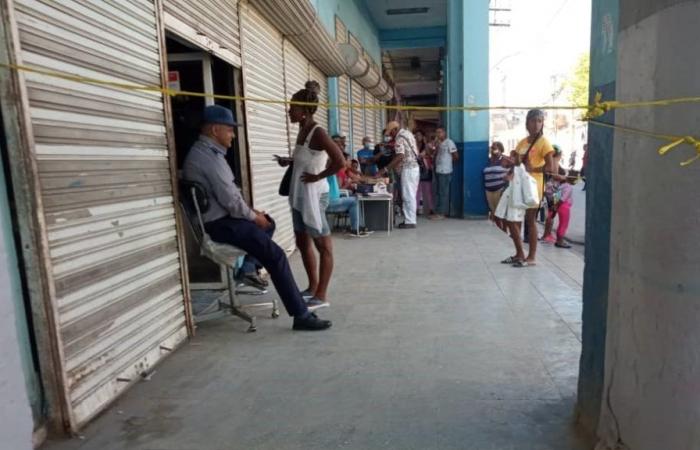
The norm of Ministry of the Revolutionary Armed Forces (MINFAR) from Cuba that decrees armed custody and declaration as a military area of “agricultural production zones, construction and assembly investments, and other urban and rural areas”, has gone under the radar of the citizenship.
Confirming their disinforming function, the official media of the Island did not report the news nor have they been responsible for investigating the implementation and scope of Resolution 9/2024, published in the official Gazette number 46 of 2024.
But for the Argentine political scientist Laura Tedescoexpert in leadership in Latin America, the above “implies a greater concentration in the power of the FAR. “Perhaps it is simply putting on paper the concentration of political, military and economic power in the FAR, something that already exists in reality.”
In dialogue with DIARIO DE CUBA, the vice dean of Humanities and Social Sciences at the Saint Louis University-Campus of Madrid and co-director of the Dialogues about Cuba project, indicated that “It is evident that the military is expanding its power.”
“This can happen for several reasons. One of them could be that Díaz-Canel’s weakness increasingly worries the military leadership, which is why they are expanding their areas of control. Another reason could be that the FAR perceives popular discontent and wants to control more and more the organs of Popular Power to avoid any type of debate or popular demonstration.”
But, he added, there is a probable cause “perhaps more complex, and that is that “the FAR are preparing a military coup in the face of the incapacity of the Díaz-Canel Government.”
Together with the MINFAR resolution, Directive 1 of the National Defense Council was published, which increases the degree of militarization of the so-called “organizational defense structures” in the provincial and municipal administrations of the People’s Power. The above will mean putting active military personnel, who respond to their superior commands and not to civil and partisan positions, in the country’s provincial and municipal governments.
The Cuban lawyer Yaxys Cires, director of Strategy of the Cuban Observatory of Human Rights (OCDH) and coordinator of the Cuba Humanista civic platform, affirms that The new determinations seem “part of the current state of paranoia.”
“Every country has what are called ‘critical infrastructures’: facilities and structures whose operation is essential and irreplaceable for the correct performance and maintenance of vital social functions, health, physical integrity, security and the social and economic well-being of the population, as well as for the functioning of public institutions and administrations. These infrastructures require a higher level of risk analysis and, if necessary, special protection. “This is very different from being considered a ‘military area’.”he pointed.
“Obviously, the measure could be related to the widespread discontent that exists and the fear of social unrest. “It seeks to increase the military presence in specific places, which fulfills a deterrent function and at the same time maintains the capacity to provide an almost immediate repressive response.”he adds.
“They had already done something similar in the summer of 2021, in the middle of the pandemic, reinforcing security in stores and specific places. However, the outbreak was in the streets and was not characterized by assault or looting of premises.”
Cires recalls that “the biggest blow to the country’s critical infrastructure is dealt by the regime itself, which maintains an inefficient economic system. But it is not only an issue of deterioration and lack of maintenance, but also of crisis management. There are issues that decades ago were managed with relative success; for example, the response to disasters, and that now become a national crisis.
Finally, he points out that “although the Cuban Penal Code has a wide range of options to repress anyone with prison, it remains to be seen if this consideration of ‘military area’ will have any reflection in criminal jurisdiction.”
However, the official argument that the designation of new military zones by MINFAR seeks to “increase the security and physical protection” of these areas is questioned by Laura Tedesco. In his opinion, these reasons “are not credible, and most of the people of Cuba know it. I believe that the reasons are especially to guarantee the power of the FAR and the continuity of a regime that benefits, first of all, the GAESA hierarchs”.
But, from all of the above, a question arises: why take this step precisely now? What does the regime’s repressive apparatus have in mind that points to the need to organize armed guards in non-military zones and introduce high-ranking officers to positions within governments?
Tedesco prefers to answer with other questions: “Will it have any relationship with the arrival of the Russian ships? Is it a way to maintain social peace in Cuba due to the arrival of these ships? Is it a reaction to the gangs that are increasingly active in Cuba?”
“I think the answer to all these questions is yes. The ‘public’ appearance of the gangs, the arrival of the Russian ships and the economic and social situation in Cuba can produce an outbreak like 9/11. Faced with this possibility, the dictatorship is reinforced by granting more power to the FAR,” he concludes.

